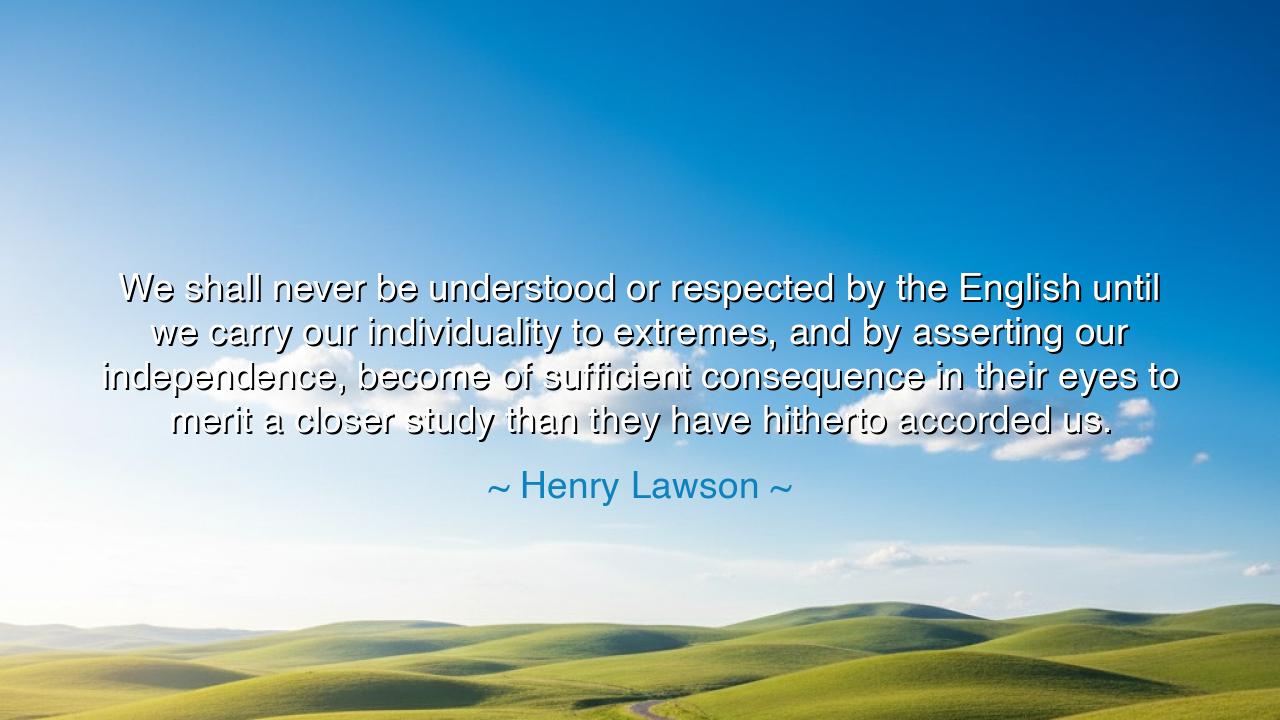
We shall never be understood or respected by the English until we
We shall never be understood or respected by the English until we carry our individuality to extremes, and by asserting our independence, become of sufficient consequence in their eyes to merit a closer study than they have hitherto accorded us.






Hear now the defiant and passionate words of Henry Lawson, the great poet of Australia’s awakening: “We shall never be understood or respected by the English until we carry our individuality to extremes, and by asserting our independence, become of sufficient consequence in their eyes to merit a closer study than they have hitherto accorded us.” These words, fiery yet wise, come not from rebellion for its own sake, but from a deep yearning — the yearning of a people to be seen, not as a shadow of empire, but as a nation in its own right. Lawson’s cry was not merely political; it was spiritual. He spoke for the soul of a young land, struggling to define itself beneath the long shadow of its parent power.
The origin of this quote lies in the heart of late nineteenth-century Australia, when the nation was still tethered to the British crown, its identity yet unformed. Henry Lawson, born of working-class roots, became a voice for the common man — for the drovers, miners, and bushmen whose lives were hard, lonely, and noble in their endurance. He saw in them the essence of Australian individuality — raw, proud, and self-reliant. But he also saw how England, the mother country, viewed Australia and its people — as a far-off frontier, a colony of rough settlers, not yet worthy of the dignity of equals. And so, Lawson’s challenge was not a call to hatred, but to assertion: to rise above imitation, to create a culture, a voice, and a destiny that could not be ignored.
In his words, “carry our individuality to extremes,” there burns a philosophy older than nations — the belief that respect is born from difference, not from submission. The ancients knew this truth well. When the Greeks were conquered by Rome, their culture survived not by mimicking Roman power, but by preserving their own spirit — their philosophy, their art, their idea of freedom. So too, Lawson urged his people: do not seek respect by becoming like the English; seek it by being unflinchingly yourselves. Only when a people dares to express its unique character, even to the point of discomfort, can it command the attention and admiration of the world.
Consider, for a moment, the great rebirth of nations that have achieved freedom not merely through arms, but through identity. India, under the guidance of Gandhi, found strength not by adopting Western ways, but by rediscovering its own moral and spiritual power. The spinning wheel and the salt march became symbols of independence far greater than any rifle could provide. Likewise, Lawson believed that Australia’s independence would not come from political decree alone, but from the forging of its own art, language, humor, and moral courage. Independence of the heart must precede independence of the law.
In truth, Lawson’s quote speaks to a universal struggle — the conflict between imitation and originality, between dependence and selfhood. Every people, every person, must one day choose whether to live under the shadow of others or to step into the sun of their own identity. The English, he implied, could not “understand” Australia because they still saw in it their own reflection — a rough, incomplete version of themselves. To be understood, Australia had to become unmistakably Australian — not an echo, but a voice. This, Lawson believed, would be the path to dignity: to live so boldly, so authentically, that the world could not help but listen.
His message still echoes in every nation that has ever sought to define itself. Whether it be the Irish reclaiming their language, the Africans reviving their art, or the colonized peoples of the world reshaping their history, the struggle is the same — to assert independence of the spirit before seeking it in law. The respect of others cannot be begged or borrowed; it must be earned through the living truth of one’s own culture, courage, and integrity. This is what Lawson meant by becoming “of sufficient consequence.” A people — or a person — earns respect not by demanding it, but by becoming something too great to be ignored.
So let this be the lesson: never trade your individuality for acceptance, nor your independence for approval. Whether as nations or as souls, your worth is not measured by how well you mirror others, but by how fearlessly you express what is uniquely your own. Be like the rough-hewn gum trees of Lawson’s beloved bush — steadfast, weathered, and reaching for the sky in your own way. For imitation wins comfort, but independence wins eternity.
Thus, my children, remember Henry Lawson’s call: live with such conviction, create with such honesty, and carry your individuality to extremes, that even those who once dismissed you must finally pause, look again, and see — not a shadow, but a light born of its own fire. For only the independent spirit, unafraid to be different, leaves behind a legacy that cannot be conquered or forgotten.






AAdministratorAdministrator
Welcome, honored guests. Please leave a comment, we will respond soon